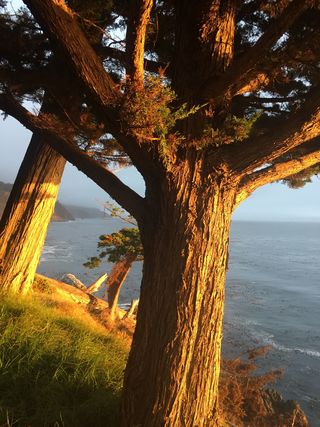Spirituality
Retreat and Return
Part 1: The value of time-out-of-time, and how to get more in your life.
Posted October 4, 2019
This past weekend, I took some much needed “time out of time” and attended a workshop at Esalen in Big Sur. For some, it’s a site of intellectual and spiritual pilgrimage that’s associated with the likes of Aldous Huxley and Joseph Campbell. For others, it’s that place Don Draper went to at the end of Mad Men.
Not everyone can or should visit this place — though it is exquisitely beautiful, and if Don Draper can find zen there, anyone can. But whether you ever set foot there or not, I wanted to bring back a piece of the serenity and experience to share with you, because its lessons and the value of retreat apply to everyone.

The dramatic ascent to this cliffside paradise rewards you with bazillion dollar views at every turn. When you do finally arrive, you’re miles from the nearest hint of civilization, left alone with nothing but nature, your own thoughts, and other like-minded seekers.
From the moment I entered the gate, I could feel myself in a state of unwinding. The frenetic energy of everyday life oozed off my body. I wanted to take in all this place and time had to offer, while dropping all the heavy baggage of life that weighed me down. I was a spool of thread, eager to unravel. I could finally stretch out.
It’s hard not to feel wild and free and fully oxygenated in the presence of such natural grandeur and seclusion. For 48 hours, there was no driving, no cooking, no technology or media, no productivity. Just being. Thinking. Listening. Writing. Reading. Breathing. Oh, and hot springs. Beautiful, ocean-side hot springs. It’s like an adult sleepover camp. A little utopia of diverse, creative, expression-oriented, health-conscious folks, trying to better themselves and the world around them. It sounds quaint (and maybe to some, a little naive), but doesn’t it also sound wonderful? It is.
Regardless of the workshop one attends (and there are many), the most significant transformation for many who visit this California oasis or any site for retreat occurs as a result of a separation from technology. Esalen and the surrounding area is a dead zone. There is zero cell service. The main lodge offers wifi at certain times of the day, but I chose not to indulge and instead made it a two-day digital detox.
I write and speak extensively on our relationships with technology, so I make a concerted effort to turn my phone off at night, keep it on silent and out of sight when spending time with others, and to minimize my automatic notifications. And yet, the battle for peace in an age of technology still wages a war on my mind and body — and general sanity — on a daily basis. Anxiety, distraction, a lack of focus or an inability to go deep, as well as disconnection from one’s own thoughts and emotions are just a few of the side effects of this modern condition.
Having my tech toys taken away for even this brief period of time quenched my thirst in a way I didn’t fully appreciate the need for until I experienced it. Now I want oh-so-much-more of it.
These brief-yet-valuable escapes from everyday life and technology (and with it, distraction) are a path to inner stillness. Why do we need this retreat into stillness? Who better to turn to for that answer than Thoreau:
“I went to the woods because I wished to live deliberately, to front only the essential facts of life, and see if I could not learn what it had to teach, and not, when I came to die, discover that I had not lived.”
It is in conscious retreat and our eventual return that we recover what we have lost through the unyielding experience of everyday life. This subtle stillness permits us to reorient our compass and return to a healthy set-point, better equipped for the vicissitudes of living — happier, clearer, and more whole.

My fellow participants spanned all walks of life, but one particularly inspiring member of my group was an older man who was there with his wife to celebrate his birthday. He’s been coming to Esalen since the 1980s, and the Saturday we spent together marked the start of his 85th year on this planet. During an exercise in which we worked to align our values and aspirations, he framed his perspective succinctly: “It’s this. It doesn’t get better than this.” The gratitude and contentment that comes with age immediately overwhelmed the group with emotion. He was the embodiment of #goals.
One of the moderators was half-Filipino, and he shared that in his culture, when one asks, “What do you do for a living?” the expression translates most directly as, “What is your search for life?” This, in many ways, is what this weekend and many of our moments of retreat are about. What are we searching for in this life? How is that search supported not only by our professional occupations, but in how we live? This is a bit different than finding your purpose, but the two are closely related.
To answer, we must first identify what makes us thrive.
For me, I thrive when…
- I read.
- I reflect.
- I listen.
- I have time in nature.
- I remove distractions.
- I connect one-on-one with great people.
- I forge my own path and refuse to conform.
- I find humor in absurdity, disappointment, hardship, and the mundane.
These things make me come alive and open the door to all that I search for in life.
In answering what it is we search for, we can take heart in knowing that our purpose is not just about what the world needs, but what makes us come alive. Our individual vitality is what the world needs more of, and if we can answer that question and fuel that fire, we give a gift not only to ourselves, but the entire world.




